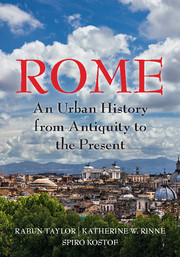Book contents
- Frontmatter
- Dedication
- Epigraph
- Contents
- List of Illustrations
- Acknowledgments
- Map
- INTRODUCTION
- 1 A BEND IN THE RIVER
- 2 A STORYBOOK BEGINNING
- 3 IDEOLOGICAL CROSSFIRE
- 4 BIG MEN ON THE CAMPUS
- 5 RES PUBLICA RESTITUTA
- 6 MEMORIALS IN MOTION: SPECTACLE IN THE CITY
- 7 THE CONCRETE STYLE
- 8 REMAKING ROME'S PUBLIC CORE: I
- 9 REMAKING ROME'S PUBLIC CORE: II
- 10 CRISIS AND CONTINUITY
- 11 RUS IN URBE: A GARDEN CITY
- 12 ADMINISTRATION, INFRASTRUCTURE, AND DISPOSAL OF THE DEAD
- 13 MAPPING, ZONING, AND SEQUESTRATION
- 14 TETRARCHIC AND CONSTANTINIAN ROME
- 15 TROPHIES AND TITULI: CHRISTIAN INFRASTRUCTURE BEFORE CONSTANTINE
- 16 WALLS MAKE CHRISTIANS: FROM FOURTH TO FIFTH CENTURY
- 17 A TALE OF TWO ROMES
- 18 THE ROME OF GOTHS AND BYZANTINES
- 19 CHRISTIAN FOUNDATIONS
- 20 FROM DOMUS LATERANI TO ROMANUM PALATIUM
- 21 THE LEONINE CITY: ST. PETER'S AND THE BORGO
- 22 VIA PAPALIS, THE CHRISTIAN DECUMANUS
- 23 THE URBAN THEATERS OF IMPERIUM AND SPQR
- 24 HOUSING DAILY LIFE
- 25 CHAOS IN THE FORTIFIED CITY
- 26 THE TIBER RIVER
- 27 HUMANIST ROME, ABSOLUTIST ROME (1420–1527)
- 28 PLANNING COUNTER REFORMATION ROME
- 29 PROCESSIONS AND POPULATIONS
- 30 MAGNIFICENT PALACES AND RHETORICAL CHURCHES
- 31 NEOCLASSICAL ROME
- 32 PICTURING ROME
- 33 REVOLUTION AND RISORGIMENTO
- 34 ITALIAN NATIONALISM AND ROMANITÀ
- 35 A CITY TURNED INSIDE OUT
- Glossary of Persons, Places, and Terms
- Works Cited
- Index
INTRODUCTION
Published online by Cambridge University Press: 05 July 2016
- Frontmatter
- Dedication
- Epigraph
- Contents
- List of Illustrations
- Acknowledgments
- Map
- INTRODUCTION
- 1 A BEND IN THE RIVER
- 2 A STORYBOOK BEGINNING
- 3 IDEOLOGICAL CROSSFIRE
- 4 BIG MEN ON THE CAMPUS
- 5 RES PUBLICA RESTITUTA
- 6 MEMORIALS IN MOTION: SPECTACLE IN THE CITY
- 7 THE CONCRETE STYLE
- 8 REMAKING ROME'S PUBLIC CORE: I
- 9 REMAKING ROME'S PUBLIC CORE: II
- 10 CRISIS AND CONTINUITY
- 11 RUS IN URBE: A GARDEN CITY
- 12 ADMINISTRATION, INFRASTRUCTURE, AND DISPOSAL OF THE DEAD
- 13 MAPPING, ZONING, AND SEQUESTRATION
- 14 TETRARCHIC AND CONSTANTINIAN ROME
- 15 TROPHIES AND TITULI: CHRISTIAN INFRASTRUCTURE BEFORE CONSTANTINE
- 16 WALLS MAKE CHRISTIANS: FROM FOURTH TO FIFTH CENTURY
- 17 A TALE OF TWO ROMES
- 18 THE ROME OF GOTHS AND BYZANTINES
- 19 CHRISTIAN FOUNDATIONS
- 20 FROM DOMUS LATERANI TO ROMANUM PALATIUM
- 21 THE LEONINE CITY: ST. PETER'S AND THE BORGO
- 22 VIA PAPALIS, THE CHRISTIAN DECUMANUS
- 23 THE URBAN THEATERS OF IMPERIUM AND SPQR
- 24 HOUSING DAILY LIFE
- 25 CHAOS IN THE FORTIFIED CITY
- 26 THE TIBER RIVER
- 27 HUMANIST ROME, ABSOLUTIST ROME (1420–1527)
- 28 PLANNING COUNTER REFORMATION ROME
- 29 PROCESSIONS AND POPULATIONS
- 30 MAGNIFICENT PALACES AND RHETORICAL CHURCHES
- 31 NEOCLASSICAL ROME
- 32 PICTURING ROME
- 33 REVOLUTION AND RISORGIMENTO
- 34 ITALIAN NATIONALISM AND ROMANITÀ
- 35 A CITY TURNED INSIDE OUT
- Glossary of Persons, Places, and Terms
- Works Cited
- Index
Summary
THAT ROME, THE ETERNAL CITY, IS THE SUBJECT OF MORE SCHOLARLY inquiry than any other urban center in the world, past or present, should surprise nobody. Its importance was established early; its political power long predominated and the cultural residue of that power has endured. Its physical fabric, a sumptuous palimpsest, pleases the eye and rewards scrutiny. Its admirers have always been legion, and the presence of hundreds of institutes, libraries, museums, archives, study-abroad programs, archaeological digs, and foreign academies in the city ensures that Rome's unmatched capacity for regenerative grandeur will continue in perpetuo.
That Rome, the Eternal City, should never have received an urban biography spanning its three millennia of human occupation – that might suitably provoke surprise. Yet it is true. Perhaps those closest to the subject, knowing well the divine density and sheer amplitude of the city's flesh and blood, have avoided the long view for fear that even their best efforts would serve up a flavorless, skeletal carcass. After all, how many subjects, at the very minimum, must an urban historian broach? Politics, architecture, industry, commerce, trade, planning, infrastructure, demographics, geography, ecology, roads and connectivity, relations to the hinterland and other cities? Ideas, arts, salons, literary circles, and patronage networks? Crime, grime, gangs, poverty, invasion, flood, fire, famine, plague, and displacement? Should the city's past life be expressed as journalism, biography, documentary, or social, economic, intellectual, or political history?
“All of these things and more,” a conscientious scholar might reply, while looking urgently for the door. Rome may simply prove too big, venerable, and variable to confront over the longue durée. Authors have understandably preferred the periodic approach, privileging a single, cohesive historical era. In recent decades several fine studies have focused on Rome under various political leaders (Augustus, Hadrian, certain popes, Mussolini) or periods (prehistory, Republican or imperial Rome, the Middle Ages, the Renaissance, the Risorgimento, Fascism). Some are genuinely urbanistic in their approach – that is, they have sought to characterize the city as an organism that interacts intensively with the people it hosts. But others present Rome simply as a passive or indistinct venue of events – as a place that was great only because of the great individuals who animated it.
- Type
- Chapter
- Information
- RomeAn Urban History from Antiquity to the Present, pp. 1 - 3Publisher: Cambridge University PressPrint publication year: 2016



